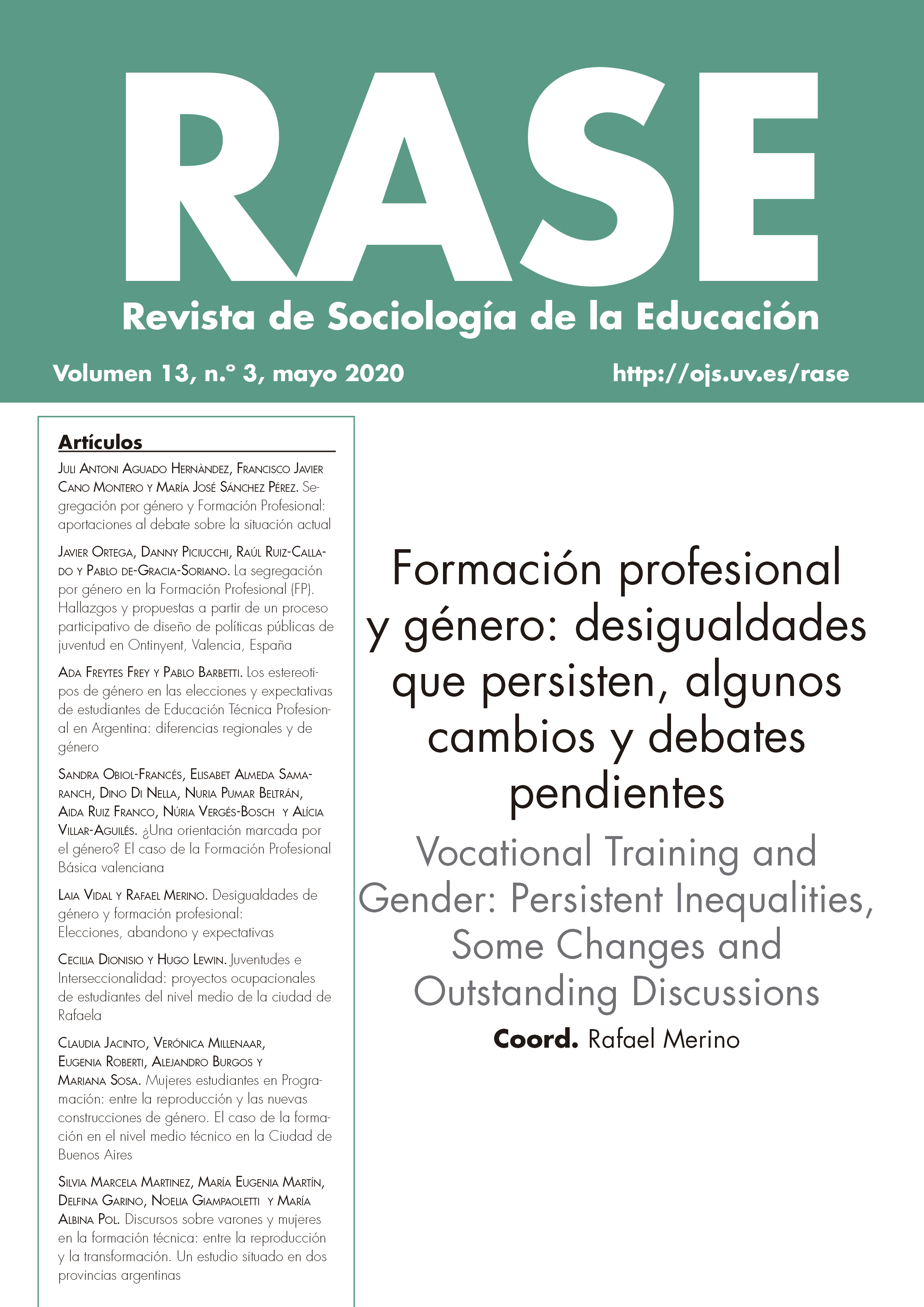Gender Inequalities and Vocational Training: Choices, Abandonments and Expectations
DOI:
https://doi.org/10.7203/RASE.13.3.16645Keywords:
Vocational training, gender perspective, female abandonment, motivations, school choices, expectations Abstract
Abstract
The current research underlines gender inequalities concerning school motivations when choosing vocational training. Regarding this, refe- rence is also made to the phenomenon of female abandonment and the expectations of post-vocational training. Subsequently, the article also brings up the sociohistorical and institutional context with regards to vocational training in Spain, within a theoretical framework based on scholar choices and gender perspectives in labour and educational segregation. Through the analysis of 12 young interviewees, the study could verify a determined persistence of gender inequalities in vocational training, especially for choice and motivation factors. Additionally, the research deviated similar arguments with regards to the differentiation in both vocational training and baccalaureate.
 Downloads
Downloads
 References
References
Baudelot, Christian. y Establet, Roger. (1972), L’école capitaliste en France, Paris, Maspero.
Baudelot, Christian. y Establet, Roger. (1992). Allez les filles! Paris: Seuil.
Benería, Lourdes. y Floro, Maria. (2005). “Distribution, gender, and labour market informalization: A conceptual framework with a focus on homeworks”, en Rethinking Informalization: Poverty, precarious jobs and social protection, Cornell University Open Acces Repository.
Beck, Vanessa; Fuller, Alison y Unwin Lorna (2006). “The impact of gender and “race” on young people’s perceptions of their post-compulsory education and labour market opportunities” a British Educational Research Journal, vol. 32, núm. 5, pp. 667- 686.
Boudon, Rauymon (1973), L’inégalité des chances. La mobilité sociale dans les sociétés industrielle, Paris: A. Colin.
Butler, Judith (2006) Deshacer el genero. Barcelona, Editorial Espasa Libros, S.L.U., Paidós Studio 167, 1ª Ed, 10ª reimp.
Carabaña, Julio (1997), “La pirámide educativa”, en Fernández Enguita, Mariano, Sociología de la educación: textos fundamentales. Barcelona: Ariel, 719-738.
Duran, Mª Ángeles (2018), “La riqueza invisible del cuidado”, Publicaciones de la Universidad de Valéncia,
Erikson, Robert; Golthorpe, John H y Portocarero, Lucienne (1979) “Intergenerational Class Mobility in Three Western European Societies: England, France and Sweden”. The British Journal of Sociology 30 (4): 415-441.
Gambetta, Diego (1978). They push or they jump? Oxford: Oxford University Press.
Marrero, Adriana y Mallada, Natalia (2009) La universidad transformadora. Elementos para una teoría sobre educación y género. Universidad de la República, Uruguay.
Martín Criado, Enrique. (1996). Jóvenes de classe obrera y formación professional: racionalidades prácticas y estrategias. Universidad de Granada. Revista de Educación, núm 311, págs 235-252.
Mosconi, Nicole y Dahl-Lanotte, Robert (2003) C’est technique, est-ce pour elles? Les filles dans les sections techniques industrielles des lycées, a Travail, Genre et Sociétés, núm. 9, pp. 71-90.
Nash, Mary. (2006), Lo intercultural en acción, identidades y emancipaciones. Identidades de género, mecanismos de subalternidad y procesos de emancipación femenina. Revista Cidob d’Afers Internacionals 73-74, Barcelona.
Salvà-Mut, Francisca.; Cerdà-Navarro, Antoni.; Calvo-Sastre, Aina. (2018). Educational Pathways and Gender Segregation: The case of Upper Secondary VET. A: Moreno, L.; Teràs, M.; Gougoulakis, P. (eds.). Emergent Issues in Vocational Education & Training. Suècia, Premiss förlag, p. 257-283.
Serra Ramoneda, Antoni. (2007) Educació superior i treball a Catalunya: anàlisi dels factors d'inserció laboral. Barcelona: AQU
Troiano, Helena; Torrents, Dani y Daza, Lídia (2019). “Compensation for poor performance through social background in tertiary education choices”. Studies in Higuer Education, DOI:10.1080/03075079.2019.1666262
Valles, Miguel (1999), Técnicas cualitativas de investigación social, Madrid, Síntesis.
Viñao Frago, Antonio (1982), Política y educación en los orígenes de la España contemporánea. Examen especial de sus relaciones en la enseñanza secundaria, Madrid: Siglo XXI.
Willis, Paul (1977), Learning to Labor: How Working Class Kids Get Work Get Work Class Jobs, Saxon House.
Downloads
Published
How to Cite
-
Abstract2004
-
PDF (Español)1235
Issue
Section
License
![]()
This work is licensed under a Creative Commons Reconocimiento-NoComercial-CompartirIgual 4.0 Internacional.




